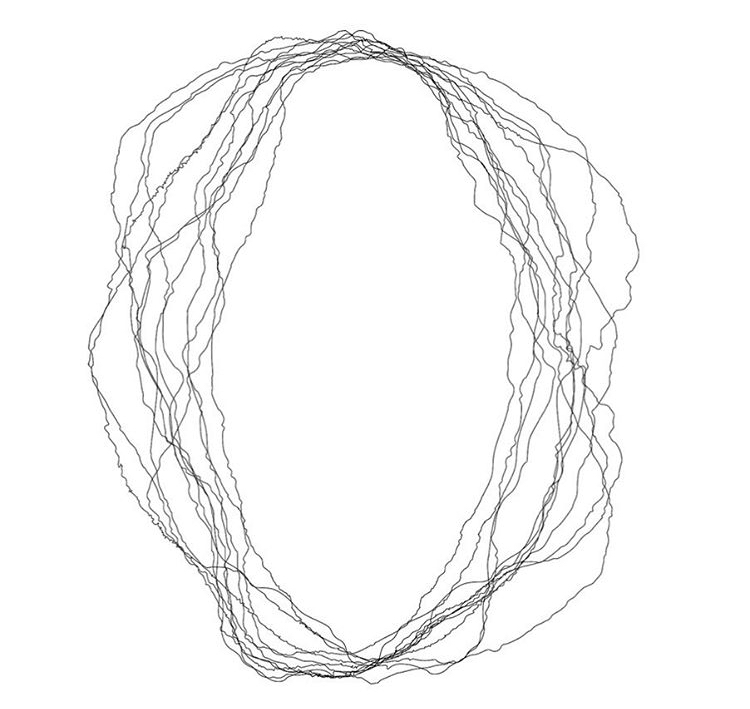The Case for Letting the Stars Determine Who I Date is an essay that reflects on how the ideology of Big Data has updated certain archaic references of the divinatory arts. In the computational universe of emotional surveillance, algorithms function as oracles: they have the ability to determine the future of networked users according to their patterns of consumption. Algorithms are no longer simply instructions to be executed, but have become scenic entities that select, evaluate and transform urban infrastructures and our ways of life.
Music by Laura Llaneli.
Within the framework of the exhibition One Day I Ran Into a Meteorite, curated by Carolina Ciuti at FABRA I COATS and produced by LOOP Barcelona Festival 2020.
*
Astrology is a creative, symbolic, intuitive and often spiritual interpretation based on astronomical information, in which reading the position of the stars at a specific time serves to understand and organise our knowledge about reality and human existence on Earth. Over time, numerous civilizations have used different forms of astrology and have left the interpretive work in the hands of unique individuals within the social group, such as shamans, priestesses, magicians and fortune tellers.
Although we have never stopped walking under the stars, our society has long since denied this kind of knowledge in favour of more rational, modern and scientific thinking. Even so, ancestral knowledge has always remained among us in some way or another; collectives and groups of all kinds have recovered it during certain periods, and some have even suffered persecution for doing so. While today we can speak of a resurgent interest in magic, esotericism and spirituality, we must not forget that there are historical precedents to all of these and that “looking towards the sky for answers” is not something we discovered recently.
The world—since it began, as some say—has always been in crisis. Each of these crises works as a kind of reset button that leads us to think that everything is still left to be done and that we discover everything for the first time: every birth, every death, every love, every heartbreak, etc. Our inability to remember what we have not experienced, our inconsistent and abstract relationship with the cosmos, leads us to think that the current crisis is the worst and most brutal, the most unexpected of changes, the gravest of disasters, and that the future is more unpredictable than ever.
“Since the world began” suggests that there was a time when the world was not a world, but something else, or that it simply was not: a world before the world, or before the world as we know it. Perhaps the inability to remember what we have not experienced has given us, instead, the ability to imagine, both individually and collectively, and through this we have created parallel universes in which to place everything we did not know how to think about. The generation of oblivion produces a constant need to locate an origin. The stars are as predictable as the universe is unknown, and it is in this space of uncertainty where we have projected our beliefs, fears and desires. This is the space in which a common imaginary is created, that comprises from black holes and the cosmic microwave background to other life forms, extraterrestrial beings and, above all, a space without mythological and legendary time.
At present, the resurgence of systems that interpret the influence of the stars in our neoliberal cosmology speaks to us, on the one hand, of the survival of an ancestral fascination with the night sky and the need to explain our origin and destiny. But above all it speaks of a greed-fuelled system of exploitation that capitalises on these needs in order to obtain an output that responds to the characteristics of the present time.
One of the most terrifying characteristics of that monster we call capitalism is its ability to devour any form or type of expression, ideology, cultural event or whatever, regardless of how anti-capitalist they may seem. In fact, as Mark Fisher points out, its mission is to phagocytise, to “preform” things even before they get the chance to become radical. It is difficult to find an outside, a counter or an anti that resists the onslaught of capital: everything is likely to become incorporated and capitalized; even the stars.
If letting the stars determine our destiny used to seem like a thing of the past, of madmen, of freaks, of feminists, of witches, of communists or of the gullible, today that is no longer the case. Núria Gómez Gabriel, as a modern day high priestess who reads the internet cosmos, tells us in The Case for Letting the Stars Determine Who I Date how this phenomenon of cannibalisation of oracles and astrology in the media language used by the big corporations that operate virtual relationship platforms has come about, and how that ancestral knowledge has consequently been transformed in the contemporary world.
One of the most common applications of astrology is the natal chart, in which the astrologer carries out a graphic interpretation of the sky at the exact time and place of a person’s birth. On her website Embodied Astrology, astrologer Renée Sils explains that this represents a human being’s first impression of light and vibration, which, in turn, establishes a basis in the perception and personality of each individual. In a way, the idea of natal charts is that they refer us to a common origin (the stars) that makes us all daughters of the same mothers and welcomes us all under one roof, but a roof that is not always the same. The stars are what define us most intimately, but also the complete opposite: they are the origin and what defines everything that is pre-individual about us.
Algorithms operate in a similar way, encoding our behaviour and making it identifiable, yet at the same time are the most impersonal thing about each and every one of us. The stars, like algorithms, tell us that this non-individual part that connects us with the great beyond is not something we can access by simply exercising our memory to remember a chronologically previous occurrence, but that it constantly returns us to what Agamben calls, in his text Genius, an “immemorial present”, which refers to “time without mythological time”. Today, the search for something spiritual is linked more to what puts us in relation with the world than to everyone searching within for an individualised self. Algorithms and stars are that which we have but does not belong to us, that part that connects the interior and the exterior, the self and the world, and that despite being us is still unknown to us. The answers we look for in the predictability of the stars, or every time we put our algorithms to work—when we open Tinder or Instagram—are, after all, the impulse to verify that we are not alone in the world, a gesture to leave a trail and at the same time find traces of the activities of other equally solitary beings.
The way we read the stars in each era not only results in a certain cosmology, but also the system for interpreting them proves who is reading them, when and where, and this is the exercise put forth by The Case for Letting the Stars Determine Who I Date. As a result of all this, we can safely conclude that the stars are not to be messed with, seeing as they reveal so much more about us than we will ever get to know about them.
Caterina Almirall



